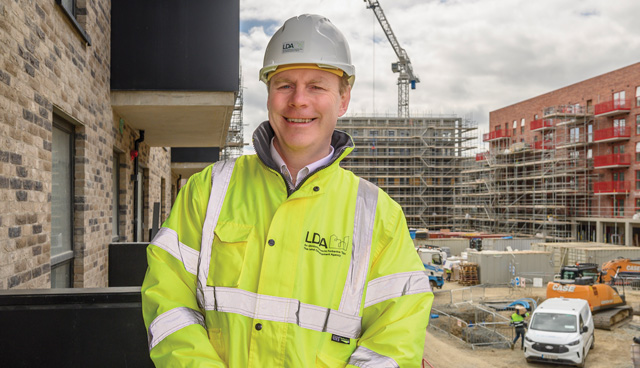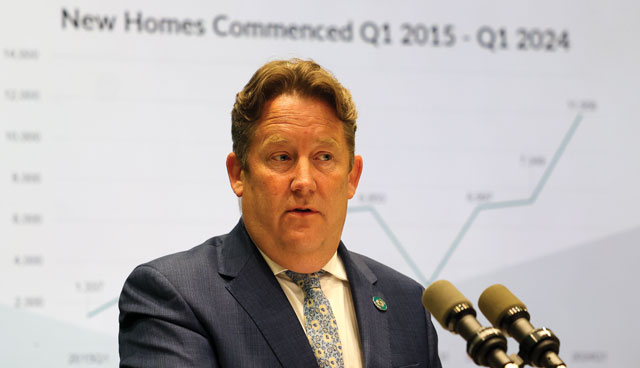
Round table discussion: Bridging the funding gap to facilitate housing delivery
4th July 2024
Decades of housing interventions have not resolved ‘fundamentally systemic failures’
4th July 2024Housing Agency CEO Bob Jordan: Rising to the housing challenge

Rising to meet the challenges of the housing crisis, The Housing Agency’s role has expanded in recent years. Ciarán Galway visits its Mount Street headquarters, to discuss purpose, bridging the funding gap, and supporting new housing supply with the agency’s CEO, Bob Jordan.
Almost three years into Jordan’s time at the helm, The Housing Agency is developing a new five-year statement strategy reflecting on how its work has expanded. Amid this expansion, the agency has increased its workforce from around 80 people when Housing for All was published to a figure of 175, with plans to increase again to 220.
“Fundamentally, the work of the agency remains the same and we continue to be an important player in terms of supporting both local authorities and approved housing bodies (AHBs) in ramping up social housing delivery.
“The most notable change that has been introduced under Housing for All, however, has been embedding affordable housing within the overall housing system. While the Help to Buy and the Local Authority Home Loan predated the Government’s new housing strategy, there were no significant affordable initiatives such as the First Home Scheme, the Local Authority Affordable Purchase Scheme, and obviously cost rental. Together, these initiatives delivered over 4,000 affordable homes in 2023.”
In one way or another, The Housing Agency has been involved in this delivery, including the design of the First Home Scheme and providing funding for cost rental via the Cost Rental Equity Loan (CREL) scheme.
“If there is a defining theme of Housing for All it is affordability, and The Housing Agency is playing a significant role in that space,” Jordan observes. “This mirrors the evolving roles of our stakeholders. For instance, local authorities are now in the business of affordable housing and AHBs are in the business of cost rental.”
Cost rental
Ultimately, through Housing for All, government aims to deliver 18,000 cost rental units by 2030. New to Ireland, the housing tenure is being delivered by AHBs, the local authorities, the Land Development Agency (LDA), and now the private sector under the Secure Tenancy Affordable Rental (STAR) scheme.
From The Housing Agency’s perspective, it is essential that each of the different delivery mechanisms are aligned. For the end user, this means ensuring that the quality is the same but also that rents are comparable in any given area. This will require significant collaboration.
Asked how the future of the cost rental housing tenure can be secured in Ireland, The Housing Agency CEO makes two salient points. “Firstly, cost rental needs to be delivered at scale, right in the centre of areas where people want to live, and where market rents are highest. We have not got there yet, but progress is being made.
“Secondly, sharing accommodation is a normal thing that people do within the private rental sector. We do not have a sharing model of cost rental yet, but it is an area in which work is ongoing and The Housing Agency is contributing to that,” he says.
Remediation
Amid its expanded workload, defects schemes, including the Enhanced Defective Concrete Blocks Grant Scheme and the Interim Remediation Scheme for Fire Safety Defects in Apartments and Duplexes, have become major components of The Housing Agency’s work.
Already, since 2014, The Housing Agency has been delivering the Pyrite Remediation Scheme, through which around 2,800 properties have been remediated. Discussing the pyrite scheme, Jordan indicates that it has entered “its mature phase” with the number of applications decreasing and he suggests it could be wound down in the coming years.
While the Defective Concrete Blocks Grant Scheme is administered by the local authorities in counties Clare, Donegal, Limerick, and Mayo, processed applications are then submitted to The Housing Agency. The agency then reviews the Building Condition Assessment (BCA) report, conducts visual inspections, and determines whether a home meets the damage threshold for entry to the scheme.
“The agency is about making the housing system work better for everyone.”
Bob Jordan, CEO, The Housing Agency
From there, The Housing Agency prioritises dwellings for assessment, sampling, testing and categorisation, and determines the appropriate remediation option required and the remediation option grant amount.
“Most importantly, we are collaborating with several stakeholders, including DHLGH, the local authorities, the National Standards Authority of Ireland, and engineers, to help people have their homes remediated at the earliest possible opportunity.
“As a demonstration of our commitment, we have opened an office in the northwest – the only office that we have outside Dublin – to focus on the location of the bulk of homes which are unfortunately affected by defective blocks.”
While a mainstream scheme is being developed, The Housing Agency is also managing the Interim Remediation Scheme to improve the safety of people living in apartments and duplexes built between 1991 and 2013 which have fire safety defects.
Overall, therefore, Jordan remains cognisant of the challenge in ensuring an adequate balance between The Housing Agency’s work to help deliver new supply and its work on remediating the existing supply.
Purpose
Defining The Housing Agency’s purpose as “helping stakeholders to deliver quality housing in sustainable communities”, Jordan asserts that “the agency is about making the housing system work better for everyone”.
There are two elements to this. Firstly, as cost rental housing has become more complex with increased government intervention, The Housing Agency has an implementation function and is tasked with helping translate policy into workable programmes.
Secondly, given the wide range of actors involved in housing delivery, The Housing Agency acts as a channel of communication and coordination between its stakeholders and the Department of Housing, Local Government and Heritage (DHLGH).
“Through data capture, pursuit of research, and delivery of policy options, The Housing Agency is also ensuring that the knowledge that is acquired through implementation is distributed across the system,” Jordan details.
On top of this, in recent years, The Housing Agency has supported the financing and funding of housing, for instance, via the Cost Rental Equity Loans (CREL), and has emerged as a temporary landlord though the Cost Rental Tenant in Situ (CRTiS) scheme.
“Where it is not clear that an existing stakeholder can deliver, The Housing Agency is stepping into the implementation gap to deliver,” he explains. “Sometimes The Housing Agency can act as a reservoir of corporate memory for the housing system, while remaining agile as a problem solver. Most importantly, we seek to ensure that the system does not grind to a halt because a programme has not been thoroughly designed or there is a step in the process that is not being delivered. We want to keep the system moving.”
“We all want the gap between people’s incomes and what they are paying for homes to close. That involves people cheering on new housing supply in their local areas.”
Report of The Housing Commission
Upon the publication of the Report of The Housing Commission on 22 May 2024, DHLGH indicated that the report would be sent to The Housing Agency to analyse its 83 recommendations in terms of costings, timelines, and prioritisation. Once that work is complete, Housing Minister Darragh O’Brien TD is set to bring finalised policy recommendations to Cabinet.
Emphasising that The Housing Agency “has just commenced its analysis and is developing the associated methodology”, the CEO instead comments on the imminent revision of the Government’s annual average housing delivery targets.
“Everyone is aware that revised targets are coming,” he says, adding: “With significantly more housing to be delivered annually, all of us are going to be asked to do more. At a macro level, financing this increase is also a challenge. Aside from government investment, the mainstream banks, PPPs, and so on, ultimately there is a need for private investment in the housing sector. That is something that must be discussed.
“Where that private finance is going to originate and whether it will be sustainable over the lifetime of Housing for All are questions that I know government is considering… That conversation is very important. The funding gap is a challenge that must be resolved.”
Indeed, speaking at a Banking and Payments Federation Ireland (BPFI) conference in June 2024, then-Finance Minister Michael McGrath TD suggested: “We have to be grown up and acknowledge that we have a great funding need that the State alone cannot meet.
“If we are to build around 50,000 units a year, then you need approximately €20 billion. The State can provide a share of that, but the banking sector, the non-banking sector, and international capital will all have to play a role. And we [Ireland] have to be open and welcoming to private capital if we are genuine and serious about meeting the housing need.”
Referencing McGrath’s comments, The Housing Agency CEO suggests that “there is investment available, from pensions funds and insurance companies, for example, which want a steady income return”. This type of investment, he believes, “is a good fit with housing which typically has a 100-year horizon”.
Urging that lessons from Ireland’s economic crisis are retained, Jordan insists that “the most important thing is keeping the pipeline flowing” to prevent a return to a scenario in which the housing capital dries up and the housing delivery sections within local authorities and AHBs fall into dormancy.
“When capital investment is removed from housing, it takes an incredible amount of time to kickstart the sector. For context, The Housing Agency recently hosted a Finnish housing delegation. We asked them how they responded to the global financial crisis, and they responded that they built many affordable houses. In a different set of circumstances, Ireland would have done the same.”
Apartments
On apartment delivery specifically, earlier in 2024, Jordan told the Business Post that “we do need more momentum in the apartment sector. We [The Housing Agency] are trying to play our part in that. Clearly there’s more momentum required.”
Elaborating on this comment, The Housing Agency CEO explains that most apartments that have been constructed in recent years are destined for the rental market. Building momentum in apartments for purchase, he contends, is equally as important.
“The idea behind the Croí Cónaithe (Cities) scheme is to activate inactive planning permissions by bridging the gap between what it costs to build them and what people are going to pay.
“We would like to see the scheme delivering even more apartments and ultimately, we would like to see momentum build for the apartment purchase market, with private developers able to produce that product as a sustainable part of the housing mix. However, we are not there yet in terms of overcoming the viability challenges.”
Acknowledging that Croí Cónaithe is a timebound intervention to help instil confidence among developers to build apartments, he reiterates his assertion that the private sector must stand on its own feet.
“Hopefully, the viability challenge will be resolved over the coming years. However, it is important that, in terms of innovation and in terms of apartment delivery, the gap is not bridged by the State alone, but also by private developers. To date, there have not been enough apartment developments for purchasers to deliver the necessary scale,” he says.
Solidarity
Previously, Jordan has also touched upon the concept of “solidarity” in pursuit of affordable housing supply and a solution to the housing crisis. Discussing this concept further, The Housing Agency CEO points to two specific challenges within the sector, facilitating rightsizing and tackling vacancy and dereliction.
Drawing on his lived experience, Jordan recalls growing up in a “standard 1970s estate” in County Kildare. “The neighbours across from our family home were our neighbours for 40 years. One day, my mother’s friend made the announcement that she was moving into a new apartment complex at the top of the street. This meant that she could move into a smaller, more manageable home, while still remaining friends with my mother at the other end of the street. We want to unlock this experience at scale.
“Many older people have contacted the agency expressing interest in rightsizing opportunities. Intergenerational solidarity, therefore, means unlocking opportunities for older people to move from larger homes into smaller homes – while remaining within their existing community – and families to move into the larger homes,” he outlines.
Similarly, Jordan references vacancy and dereliction. “Counterintuitively, thanks to the Covid pandemic – and public health restrictions on travel – people became reacquainted with their locale. A growing intolerance for vacancy and dereliction emerged, allied to increasing community action.
“In the past, the local Tidy Towns committee would put flower boxes on the windows of the vacant property. Now what is happening is the community are getting the property done up. That is a whole different proposition. That is what I mean by solidarity,” he explains.
As a result, there has been increased uptake of relevant Housing for All schemes, including the Vacant Property Refurbishment Grant, which is delivered by the local authorities under the Croí Cónaithe (Towns) Fund scheme.
Not alone does solidarity unlock housing, therefore, in Jordan’s definition “it is about communities saying, ‘We are not accepting this anymore. We are going to do something’.”
“More broadly, we all want the gap between people’s incomes and what they are paying for homes to close,” he says, adding: “That involves people cheering on new housing supply in their local areas. While that might have an impact on house prices, obviously it will also have a much more significant impact on the people who do not currently have a home. That is what I mean by solidarity.”
Vision
Looking ahead to the implementation of the first revision of the National Planning Framework, which is scheduled for September 2024 – by which time the ESRI will have published its final report on housing need in line with population projections – The Housing Agency is contemplating its role in contributing to increased housing delivery, while “continuing to embed affordability and ramp up cost rental”.
“Communication is particularly important. There is a myriad of schemes and while it is important that our stakeholders – DHLGH, the local authorities, and AHBs – understand them, it is even more important that the public understands what is available.
“As such, we have established affordablehomes.ie and are seeking to make that more interactive to help people determine the schemes of which they can avail. We would like to get the schemes to a settled state and then focus on delivery,” Jordan summarises.







